How AI is Transforming New Zealand's Agricultural Sector
DW
Introduction to AI in Agriculture
New Zealand, with its rich agricultural heritage, is embracing the digital revolution to enhance productivity and sustainability in its farms. Artificial Intelligence (AI) is at the forefront of this transformation, offering innovative solutions to age-old challenges. From precision farming to livestock management, AI is reshaping the landscape of agriculture in this island nation.

Precision Farming: A Game Changer
One of the most significant impacts of AI in New Zealand's agricultural sector is precision farming. This technology leverages AI algorithms to analyze data collected from various sources such as drones, sensors, and satellites. As a result, farmers can make data-driven decisions on crop management, leading to increased yields and reduced waste.
Through AI, farmers can now predict weather patterns, monitor soil health, and optimize resource usage. This not only boosts productivity but also promotes sustainable farming practices by minimizing the overuse of water and fertilizers.
AI-Powered Drones and Sensors
Drones and sensors play a crucial role in precision farming. Equipped with AI, these technologies offer real-time insights into crop health and growth patterns. Farmers can quickly identify areas that require attention and take corrective measures, ensuring that crops receive the optimal care they need.

Livestock Management: Enhancing Welfare and Efficiency
In addition to crop farming, AI is making significant strides in livestock management. New Zealand's farmers are using AI-powered systems to monitor animal health and welfare. By analyzing data from wearable devices and cameras, AI can detect early signs of illness or distress in livestock, allowing for prompt intervention.
This proactive approach not only enhances animal welfare but also improves farm efficiency. Healthy animals are more productive, leading to increased profitability for farmers.
Automated Feeding Systems
AI is also revolutionizing feeding processes. Automated feeding systems powered by AI can determine the precise nutritional needs of each animal, delivering customized feed portions. This not only ensures optimal growth but also reduces feed wastage, contributing to cost savings.

Challenges and Opportunities
While the benefits of AI in agriculture are clear, there are challenges that need addressing. The integration of AI technologies requires significant investment and technological infrastructure, which may be a barrier for smaller farms. Additionally, there is a learning curve associated with adopting new technologies.
However, these challenges present opportunities for collaboration between tech companies, government bodies, and farmers. By working together, they can develop scalable solutions that make AI accessible to all levels of New Zealand's agricultural sector.
The Future of AI in New Zealand Agriculture
The future of agriculture in New Zealand looks promising with AI at its helm. As technologies continue to evolve, farmers will have access to even more sophisticated tools that will further enhance efficiency and sustainability. The continued investment in AI will play a crucial role in ensuring New Zealand remains a leader in innovative farming practices.
In conclusion, AI is not just a tool but a transformative force that is reshaping the future of agriculture in New Zealand. By embracing these advancements, the nation is setting a precedent for sustainable and efficient farming worldwide.
